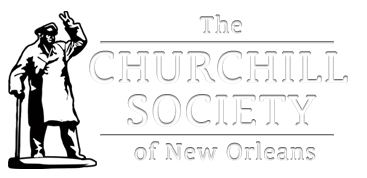High School Essay Contest
The Churchill Society of New Orleans sponsors a yearly essay contest for the purpose of encouraging young people to learn more about the great man, and thereby to absorb some of his wisdom, his courage, and his masterful use of the English language.
The winners of the 2022-2023 contest are as follows:
First Prize ($1,500): Apollo Stafford, Saucier, MS
Second Prize ($500): Carson Collins, Austin, TX
Third Prize ($250) (tie): Anthony Lawler, Metairie, LA and Caleb Haber, Long Beach, MS
See below for information about the 2023-2024 Essay Contest.
Please address any questions about the contest to Ben Capshaw at bcap031047@gmail.com or Ted Martin at tmartin242526@gmail.com
Complete the Online Entry Form below, upload your essay, and press the Submit button. You will receive an email confirmation upon successful submission.
Online Entry Form
OR
Mail or hand-deliver your essay and entry form (download the entry form Word or PDF) by April 8th 2024 to the following address:
Churchill Society of New Orleans
150 Broadway, Apt. 712
New Orleans LA 70118
2023-2024 Prizes
First prize is $1500
Second prize is $500
Third prize is $250
If at least 5 students at a school submit essays and none of them wins the first, second or third prize, the best of those essays will receive a prize of $100. The teacher named by the student who wins the first prize will also receive a prize, $500.
2023-2024 Essay Topic
“Churchill mused, as he took the helm of Britain in May 1940:
“I felt as if I were walking with destiny, and that all my past life had been but a preparation for this hour and this trial”.
What were some experiences that prepared him, and why was he the right man to take the job?
2023-2024 Essay Contest Rules
1. All students at any high-school level are eligible to participate.
2. The essay should address the Topic given above.
3. Essay should be between 500 and 1000 words, typed double spaced.
4. Essays will be judged on knowledge of Churchill, relevance to the Topic, and good use of the English language.
5. A student’s teacher and parents are encouraged to help with the research and to comment on essay drafts, but the student must produce the paper. We ask that the name of the teacher responsible for the student’s participation be provided on the Entry Form.
6. The deadline for the 2023-2024 contest is April 8th, 2024.
If a teacher would like a member of the Board of the Churchill Society to speak to students about Churchill, please call Ted Martin at (504) 284-8578 or Ben Capshaw at (504) 957-4999.
The Society will be happy to provide books on Churchill to a participating school, if requested.
Background Material:
Besides information bearing on the Topic that might be found elsewhere, be sure to study the material under “About Churchill” on this website.
Tips for a Winning Essay:
1. Be sure of your facts before you write something that is wrong – like the country in which something took place, or the role that Churchill played.
2. Proofread your essay. Reading it out loud will help you to find mistakes – words left out or misused.
3. Attaching a bibliography to your essay will help the judges understand how you obtained the ideas and information in your essay.
4. Churchill supported himself and his family by writing books, which sold well. He used short words and short phrases to get his points across effectively. Here is an example from one of his speeches:
“Come then, let us to the task, to the battle, to the toil – each to our part, each to our station. Fill the armies, rule the air, pour out the munitions, strangle the U-boats, sweep the mines, plough the land, build the ships, guard the streets, succor the wounded, uplift the downcast and honor the brave.”
5. In your writing, aim for clarity and brevity. Your essay will be short, but it can say a lot if you write carefully and thoughtfully.
6. Try to put forth several points rather than repeating the same one in different ways.

